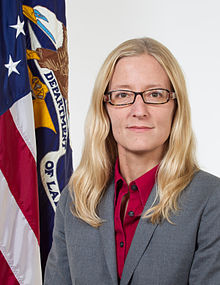

 | |
| Formation | 1986; 38 years ago (1986) |
|---|---|
| Founder | Jeff Faux, Lester Thurow, Ray Marshall, Barry Bluestone, Robert Reich, Robert Kuttner |
| Type | Public policy think tank |
| Location |
|
| Coordinates | 38°54′06″N 77°01′45″W / 38.901627°N 77.029256°W / 38.901627; -77.029256 |
President | Heidi Shierholz |
Revenue (2018) | $8,020,337[1] |
| Expenses (2018) | $6,699,574[1] |
| Website | www.epi.org |
The Economic Policy Institute (EPI) is a 501(c)(3) non-profit American think tank based in Washington, D.C., that carries out economic research and analyzes the economic impact of policies and proposals. Affiliated with the labor movement,[2][3][4] the EPI is usually described as presenting a left-leaning and pro-union viewpoint on public policy issues.[5][6] Since 2021, EPI has been led by economist Heidi Shierholz, the former chief economist of the Department of Labor.
EPI has an advocacy arm, EPI Action, which is a 501(c)(4) group.
EPI was founded in 1986 by economists Jeff Faux, Lester Thurow, Ray Marshall, Barry Bluestone, Robert Reich, and Robert Kuttner.[7] Since 2021, Heidi Shierholz has served as its president.[8] Shierholz succeeded Thea Lee, who was named Deputy Undersecretary for International Affairs at the Department of Labor by President Joe Biden.[9]
EPI supported Bernie Sanders's Medicare for All proposal. In a March 2020 policy paper, it argued that the loss of jobs in the insurance industry and in administering the current system would be small, within the normal job churn, and easily absorbed by the economy. The paper argued that this cost would be outweighed by the benefits of universal health care and in small business formation.[10][11] EPI has also released policy papers analyzing U.S. investment in early childhood education.[12]
In July 2012, EPI and the AFL–CIO, Center for Community Change, Leadership Conference on Civil and Human Rights, National Council of La Raza and SEIU proposed a budget plan titled Prosperity Economics, a counter to the Republican Party's Path to Prosperity budget plan. The Prosperity Economics plan suggests that major public investment in areas like infrastructure is needed to jump-start the economy.[13]

In response to the debate over the United States fiscal cliff, EPI economist Josh Bivens advocated raising tax rates for higher income earners, writing: "Given this rise in [income] inequality, it makes sense that much of the future burden of reducing budget deficits should be borne by those who have benefited the most from economic trends in recent decades."[14]
Eight labor unions made a five-year funding pledge to EPI at its inception: AFSCME, United Auto Workers, United Steelworkers, United Mine Workers, International Association of Machinists, Communications Workers of America, Service Employees International Union, and United Food and Commercial Workers Union.[15] According to EPI, about 29% of its funding between 2005 and 2009 was supplied by labor unions and about 53% came from foundation grants.[7]
In the 1980s, EPI took money from the Tobacco Institute, a now-defunct tobacco industry trade group, to oppose excise taxes on the tobacco industry's behalf. The Tobacco Institute worked with groups like EPI "to support the release of studies, editorials, press briefings, and testimony against regressive excise taxes" that would negatively impact the tobacco industry's bottom line if passed.[16]
'It doesn't work if you bring in the hallelujah chorus,' said Thea Lee, president of the Economic Policy Institute, a left-leaning Washington think tank.
The left-leaning Economic Policy Institute in the report also said that 57,500 graduate students who are already unionized would lose the ability to collectively bargain with their schools under the September proposal.
The left-leaning Economic Policy Institute projects up to three million jobs lost by summer.
The report from the left-leaning think tank said that number was slightly lower than 2015, when average pay was $16.3 million and the ratio was 286-to-1.
Chief executives of the country's largest firms made 303 times more than a "typical" worker in 2014, according to a report from the Economic Policy Institute, a left-leaning think tank.
The foundation's roster of grant recipients has been similarly eclectic: the right-wing Heritage Foundation and the liberal Brookings Institution. The progressive Center for American Progress, the free-market American Enterprise Institute and the pro-union Economic Policy Institute.
Economic Policy Institute ... Pro-union; favors more equal distribution of wealth
{{cite book}}: CS1 maint: multiple names: authors list (link)| International |
|
|---|---|
| National |
|
| Academics |
|
| Other |
|